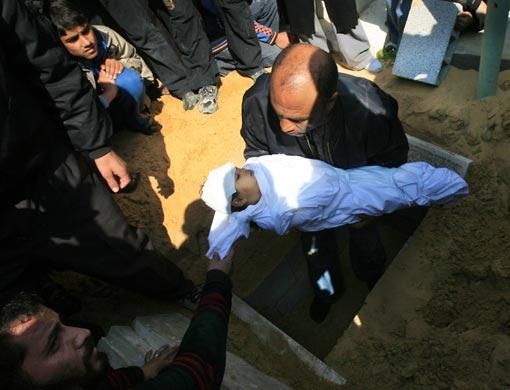Occupied Jerusalem: Gaza's inhabitants are resorting to burying their dead as quickly as possible because of the Israeli military attacks and out of respect for the dead person's soul.
There is also the added fact that there is no space in the hospitals' morgues.
"Gaza's hospitals, in particular the hospitals in the northern part, are overcrowded with a number of martyrs and the injured who are in need of urgent operations due to critical wounds.
"Many of the injured have had parts of their bodies amputated as a result of injuries from the internationally forbidden missiles," the general manager of the ambulances section in the Ministry of Health in the Gaza Strip told Gulf News.
Dr Mu'awiyah Hussain appealed to the World Health Organisation (WHO) and its representatives to find a speedy mechanism to provide the Gaza Strip with aid, medical supplies and medicine.
"Many of the martyrs are identified and taken out of the hospital in minutes; without even waiting for their relatives to arrive so that the hospital will have enough space to receive more martyrs and the injured," one nurse in the emergency room of a hospital in Gaza told Gulf News.
Moreover, the thing that makes the situation more tragic is that the construction of gravestones remains impossible due to a lack of cement as a result of the strict Israeli blockade. According to Israeli standards, cement is considered a luxury; therefore, its entry is not allowed.
Abu Abdullah, a 42-year-old from Jabalya, had a brother who was killed in the violence. They were unable to bury him in a fashion befitting a martyr.
"My wish was to bury my brother Muath in a sacred grave all alone, but because the essential materials weren't provided to build the grave, we placed him in a communal cemetery besides our father and some of our relatives," Abdullah told Gulf News.
In this manner, the Gaza Strip's martyrs remain without white shrouds or white graves and their corpses remain exposed to the air.
"Is there anybody who can help," Yousuf Al Mansi, the Palestinian Minister of Endowment and Religious Affairs of the Hamas-led government in the Gaza Strip asked the media.
Al Mansi warned of an upcoming humanitarian disaster in the Gaza Strip if Israelis continue their closure of the passage and their forbiddance of the entry of concrete to Gaza.
A report by The Palestinian Centre For Human Rights in the Gaza Strip warned that the dead being buried without graves and without markings would adversely affect the environment. The report considered the Gaza Strip to be more of a "death encampment."
Palestinians have appealed to Egypt to re-open the Rafah passage to get some concrete at least for the sake of the dead.













